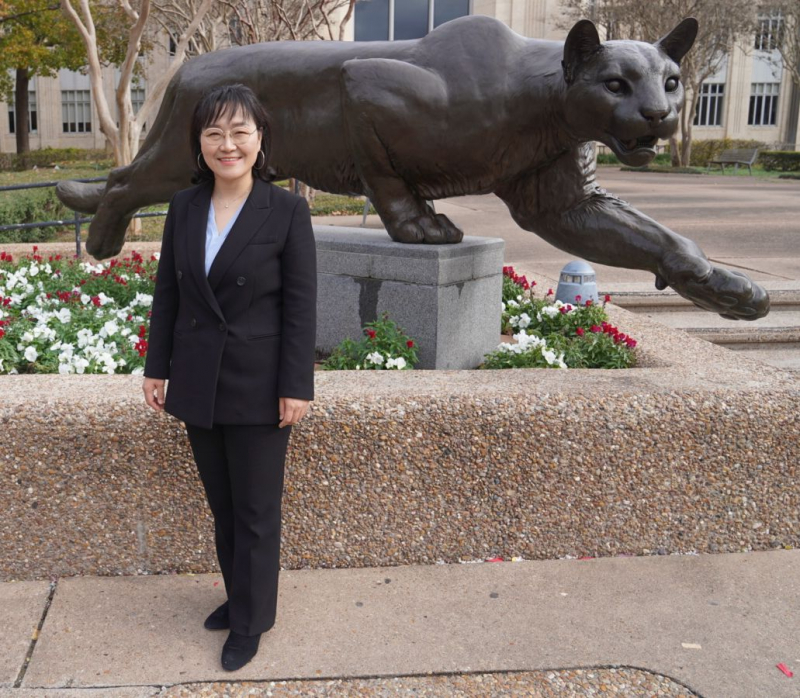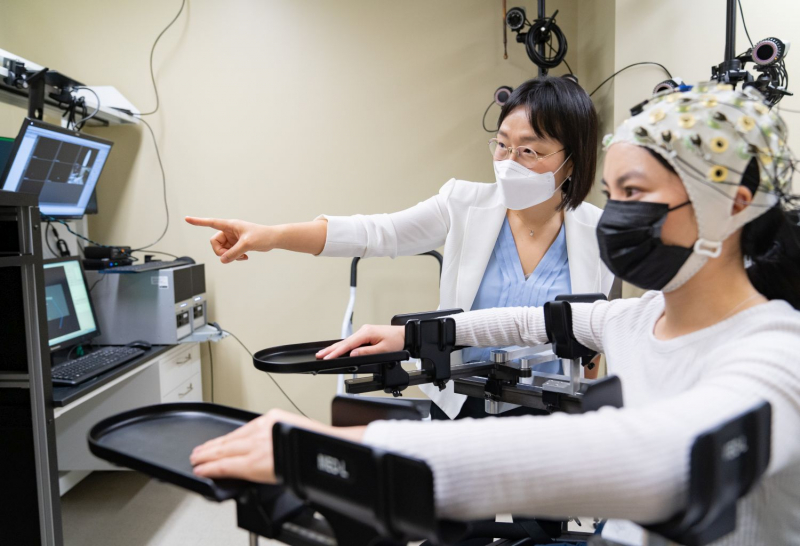When it comes to rehabilitation efforts following a stroke, Jinsook Roh of the Cullen College of Engineering stresses that one simply can't address the effects of the incident – a more holistic approach, looking at why and how a patient's movement has changed, for example, is needed, as well as objective measurement criteria.
“My current work aims at developing a new human-machine interface device that will facilitate stroke rehabilitation,” she said. “When you think about current stroke rehabilitation, some of the critical limitations of the current protocol focuses on treating symptoms. Our brain controls muscle to make action. But stroke survivors, they have damage in their neural tissue, and that's why the damaged neural tissue makes an incorrect motor command, and incorrect movement is generated. In the rehabilitation protocol targets, if we only change this movement trajectory, then we are neglecting the cause and focusing on the consequences.”
Roh wants to develop a rehabilitation model that is tailored to individual patients, and that measures the cause of neural impairment, instead of fixing just the consequences of that impairment. Or, as Roh puts it, “How the brain controls the muscle, instead of how the motion is made.”
“My long-term goal is to develop a kind of novel adaptive human machine interaction device,” she said. “It would enable researchers to automatically measure and quantify motor impairment, and also develop new therapy protocols. This device will be based on the how the brain controls coordination of multiple muscles. The system will use multiple data types including brain, muscular, and force data measured in the arm, which help us see motor impairment holistically.”
The approach has led to Roh's first National Science Foundation grant, and a CAREER award. “Neuromuscular Coordination (NeuroCoord)-Guided Human-Machine Interaction for Quantifying and Improving Motor Function after Stroke” was chosen for $544,539 in funding by the NSF on Jan. 11, 2022.
Roh, an assistant professor of biomedical engineering, noted that her research has evolved over time, from an initial interest in physics to the characteristics of movement in creatures. She earned her doctorate from the Massachusetts Institute of Technology (MIT) and her B.S. from Ewha Womans University in Seoul, South Korea.
After earning her doctorate, Roh worked as a postdoctoral research fellow at Northwestern University, before being hired as an assistant professor of kinesiology by Temple University. She joined the University of Houston in 2018.
“I think engineering was more appropriate for the research I was doing,” she said of joining the Cullen College of Engineering, adding that the City of Houston was a draw as well. “I'm grateful to be here because Texas, especially the Houston area and within Houston, there are more than 30 different hospitals, including the TIRR Memorial Hermann Hospital. So for me, it's much easier to make a clinical collaboration here that was essential for my study.”
Roh identified three people outside of UH as having significant, positive impact on her career development – William Zev Rymer, the director of the Single Motor Unit Laboratory at the Shirley Ryan AbilityLab (formerly the Rehabilitation Institute of Chicago); B.J. Fregly, a mechanical engineering professor at Rice University; and Steven L. Wolf, a professor in the department of rehabilitation medicine at the Emory University of Medicine in Georgia.
Roh said that Rymer was “amazing” because of his ability to know the strengths and the research of individuals on his team, while still being able to manage and to see the big picture for one of the leading research hospitals.
Fregly assisted Roh with writing and applying for the NSF grant. While she's applied for and received funding from the National Institutes of Health and the American Heart Association in the past, she noted that this was her first time receiving NSF funding.
“His input was very important for me, to really think about the innovation in the engineering of my research, which is the most important part for the NSF grant proposal,” she said.
Roh added that Metin Akay, the department chairman of biomedical engineering at the Cullen College of Engineering, was also vital in encouraging her to pursue NSF funding as well.
“His encouragement was so helpful for me, to think about this type of grant more, because as I mentioned before, I'm usually writing NIH grants instead of NSF types,” she said. “The department support was critical, because without the equipment and the staff support, I couldn't think about this kind of project.”
When it came to Wolf, Roh said he provided mentoring support for her.
“He's not only expert in the field, he also has a heart and cares for the career development of young junior faculty like me,” she said. “From time to time as an external mentor, he gave me some tips and ideas about career development.”
Roh identified two doctoral students – Gang Seo and Yoon No Hong – as participating in the research for this grant. The grant runs through May 2027. She added that her lab is also looking for people recovering from strokes with arm impairment to participate in research projects. For more information or to contact her, visit the lab's website here.

